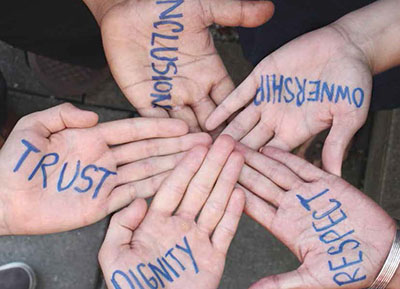The 2013 Interpeace annual report is now available

The 2013 Interpeace Annual Report, titled Peace is Possible, has been officially released and is also available online. This annual report features Interpeace’s 20 year history of peacebuilding in addition to the organization’s 2013 highlights.
20 years of peacebuilding and 2013 highlights
The 2013 Annual Report reflects on our work throughout the year and on the various milestones reached in the last 20 years. The 20th anniversary section of the 2013 Annual Report traces the growth of Interpeace from its inception in 1994 until the present. Now operating in 21 countries worldwide with over 300 peacebuilders, Interpeace’s journey to become a leading peacebuilding NGO is visually documented in this year’s edition of the annual report.
Some of the 2013 Highlights include:
• New peacebuilding initiatives in Mali, Libya and the Great Lakes region
Interpeace has launched new peacebuilding programmes in Mali, Libya and the Great Lakes region of Africa in 2013. The Great Lakes programme is Interpeace’s first-ever regional programme and focuses on creating cross-border dialogue in the borderlands of Burundi, Rwanda and the Democratic Republic of the Congo’s North and South Kivu provinces.
• Creation of the Regional Office for West Africa
To increase support for peacebuilding initiatives in Côte d’Ivoire, Guinea-Bissau, Liberia and Mali, Interpeace established the Regional Office for West Africa in 2013. Maintaining sustainable peace in the region requires continued presence and support to Interpeace’s partners on the ground. The establishment of the office in 2013 also allows for closer coordination and greater cost-efficiency in peacebuilding activities.
• Timor-Leste national education curriculum
Timor-Leste faces challenges to building trust between its population and national institutions. Corruption, collusion and nepotism plague public institutions. Interpeace and its partner, the Centre of Studies for Peace and Development (CEPAD), worked with the Ministry of Education to incorporate a storybook on corruption into the 2013 national curriculum to raise awareness of the problem through education.
• Violence-free zones in Central America
Violence in Central America has been rampant, especially among the youth populations of Guatemala, El Salvador and Honduras. To encourage youth to participate constructively in their societies, Interpeace has supported the creation of training programmes for young people. Additionally, a ceasefire between rival gangs in El Salvador has caused the rates of homicide to drop in the region, further improving the prospects for peace.
Future of peacebuilding and the way forward
The newest annual report presents 2013 as a year of milestones and continued progress for Interpeace. Reflecting on our past peacebuilding experiences is an important step in continuing on the path towards peace. Although future challenges may await, Interpeace will continue to support peace processes in places where our approach can have a positive impact on people’s lives.
Be sure to download the full report.
